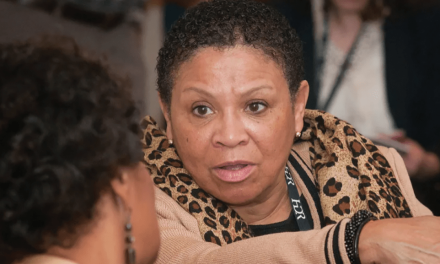By Shannon Thomason
UAB News
Nore Hodge did not plan to get involved in student activities when he started as a freshman at the University of Alabama at Birmingham. But when he attended his first Blazer Male Excellence Network (BMEN) event, he was hooked.
The BMEN Peer Mentoring Program is designed to provide academic and social support to Black male students entering UAB. BMEN’s goal is to improve the new student’s quality of life by partnering them with a returning student and providing information on navigating the collegiate experience inside and outside the classroom.
While applying to UAB, Hodge says, representatives for BMEN shared information on the program and won over his mother. He signed up, not really planning to follow through; but that changed after the first Enrichment Week event, when mentors and mentees come early to meet and get a head start on what college life is like. As soon as he met with the group, “it was just a good sense of belonging.”
“You are who you keep around, and I loved who was around me,” Hodge said. “And that kind of helped propel me: ‘OK, this is something I want to keep participating in.’”
Now, as he prepares to graduate with a degree in materials engineering from the School of Engineering on April 30, Hodge has been awarded the organization’s Green Blazer of Excellence. It is the group’s highest honor, and recipients of the recognition must excel in the classroom, have leadership in BMEN and in the campus community, participate in research, and be highly respected by their peers. The honor “encapsulated everything” in his college career, he said.
Originally from Downey, California, Hodge moved to Alabama with his family when his father was promoted. A member of the UAB Honors College Personalized Path, Hodge also is a Presidential Scholar, is active in Student Multicultural and Diversity Programs, including Black Student Awareness Committee, International Mentors and Free Food for Thought, and even worked with UAB Student Media.
Striving for excellence is something you hear all the time in the program, but it is about more than just grades.
“It’s like, ‘oh yeah, get straight A’s, be the best you can be,’” Hodge said, “but they were nonstop: ‘This is someone you can look up to, here’s a role model, here’s your peers who are also excellent.’” His first college friends were BMEN. Hodge says these interactions helped mold him “into a more complete individual.”

UAB is working to improve the retention and graduation rates of its students. Nationally, Black males have the lowest retention rate of any group on most college campuses, according to BMEN. The BMEN Peer Mentoring Program is one way to connect Black males to the university and help them successfully transition to UAB. The retention rate for Black men has increased at UAB significantly since the start of the BMEN program, says Mentor Programs coordinator and BMEN adviser Sharifa Wip.
BMEN aims to enhance the relationship between the university and its students and help increase retention and graduation rates by providing students with the resources to achieve their educational goals. The program helps members grow personally, intellectually and professionally, gives them opportunities to become leaders, and encourages them to share and apply new knowledge and information to their mentor and mentee roles. The mentors are selected each spring and go through extensive training to offer the best services possible.
Hodge is very humble and exactly the kind of student you root for, says Christopher Jones, Ph.D., director of the UAB Student Multicultural and Diversity program.
“He gets along with just about anyone and has a genuine passion for learning,” Jones said. “He has been an example for others in the BMEN program as well as all the students in the Student Multicultural and Diversity Programs Office. I have no doubt that he will have a successful career as an engineer but will also be a real change agent in the world.”
Hodge’s advice for new students? Time management. There will be hard courses, but the material is not really the hard part.
“You have all this freedom. No one’s going to tell you to go do something,” Hodge said. “It’s up to you if you do your homework. You’ve got to prioritize which classes are harder than others.”
Hodge says he is grateful for Jones and Wip and credits his mentors Dejon Frazier and Cstephan Hutcherson.
After graduation, Hodge says, he plans to go into the materials engineering industry, then pursue a doctoral degree.











